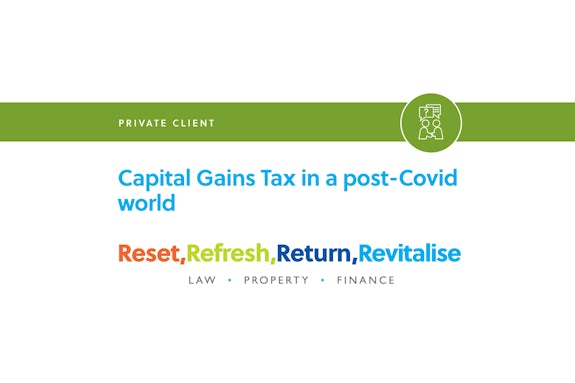By Gilson Gray
March 5, 2021

It is clearly folly to attempt to predict the future, particularly in the realm of taxation. However, what is undoubtedly true is that we are living in unprecedented times. Since the beginning of lockdown in March, the UK Government has committed somewhere in the realm of £160 billion in the fight against the Covid-19 outbreak. And, as we are all aware, it will be necessary to retrieve this money from somewhere in the exchequer’s pockets.
It is likely to have escaped the attention of most that earlier this month, Rishi Sunak wrote to The Office for Tax Simplification (OTS) calling for a review of capital gains tax (CGT) in the run up to autumn’s budget. The Chancellor’s letter stated that the review should “address areas where the present rules can distort behaviour or do not meet their policy intent”.
Under the current CGT system, gains are charged at either 10% or 20%, depending on your income tax bracket (with the exception of gains on residential property which is charged at 28%). There is no charge on the disposal of an individual’s principal private residence and each individual currently has an annual allowance of £12,300 (2020/2021).
Last year, The Institute for Public Policy Research called for a return to the days of capital gains tax being taxed at the same rate as income tax. Given that the majority of CGT disposals are made by those in the higher income tax bracket, it was suggested that such a change could raise in relation of £90 billion over the next five years.
From a practical level, this would raise the CGT rates to 41% for higher tax rate payers and 46% for additional tax rate payers in Scotland. As a very basic example, a higher rate tax payer selling a second residential property with a gain of £250,000 would attract a CGT bill of £97,457 as opposed to £66,556 under current rates.
CGT would also, of course, apply on the sale of investments, the selling or restructuring of businesses, transferring assets to family members (even if that transfer is for no cost) or any other type of asset disposal.
Change in some form is almost certainly afoot and, therefore, if you are considering any form of disposal in the near future, we would highly recommend taking professional advice as soon as possible to make advantage of current rates. Our highly experienced Private Client team can assist you every step of the way to ensure that disposals are structured in the correct way at the correct time. Please contact us with any queries you may have.
The information and opinions contained in this blog are for information only. They are not intended to constitute advice and should not be relied upon or considered as a replacement for advice. Before acting on any of the information contained in this blog, please seek specific advice from Gilson Gray.

Joe oversees the day to day management of our Private Client team and advises a broad range of private clients about trusts, tax and succession matters.
He believes in harnessing the use of legal technology to improve the legal service that he and his team provide to their clients. Joe offers a modernised approach to all areas of succession planning.